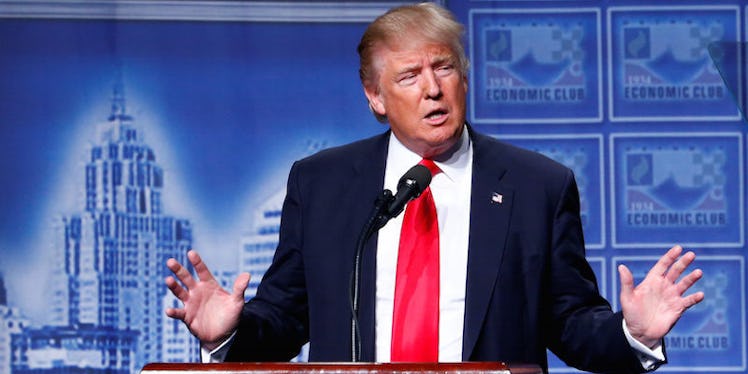
There's An Actual Rule Against Doctors Saying Trump Has A Mental Illness
With candidates like Donald Trump in the running, this particular presidential election has been anything but ordinary.
Throughout the race, lots of people have been giving their expert opinions on what might be going beneath Donald's signature 'do. However, it turns out that doctors who dub Trump as "crazy" could actually get themselves in some serious trouble.
Dr. Maria A. Oquendo, president of the American Psychiatric Association, just issued a statement on APA's website asking her fellow psychiatrists to stop psychoanalyzing Donald Trump from a distance because it is “irresponsible, potentially stigmatizing and definitely unethical.”
So, what's the big deal with analyzing Trump's behaviors from afar?
It's the potential of a big fat lawsuit, that's what.
Back in 1964, Fact magazine published a survey that revealed 1,189 of the 2,417 psychiatrist participants agreed that Barry Goldwater, the Republican presidential nominee at the time, did not seem psychologically fit to be the nation's next president. As a result, Goldwater sued the company for libel.
After a lengthy court case, the Goldwater Rule was added to the ethics handbook used by the American Psychiatric Association.
The rule states,
On occasion psychiatrists are asked for an opinion about an individual who is in the light of public attention or who has disclosed information about himself/herself through public media. In such circumstances, a psychiatrist may share with the public his or her expertise about psychiatric issues in general. However, it is unethical for a psychiatrist to offer a professional opinion unless he or she has conducted an examination and has been granted proper authorization for such a statement.
The Goldwater Rule has been in effect since 1973. However, this hasn't stopped psychiatrists from diagnosing Trump with a variety of mental heath disorders since he announced his decision to run for president.
It's important to note that Oquendo's plea to leave Trump alone has nothing to do with her political views; it simply has to do with her concern regarding the ethical treatment of patients.
In the statement, Oquendo writes,
I can understand the desire to get inside the mind of a presidential candidate. I can also understand how a patient might feel if they saw their doctor offering an uninformed medical opinion on someone they have never examined. A patient who sees that might lose confidence in their doctor, and would likely feel stigmatized by language painting a candidate with a mental disorder (real or perceived) as 'unfit' or 'unworthy' to assume the Presidency.
If Oquendo's statement doesn't seem to do the trick, I guess she could always ask that melodramatic YouTube dude to make a special Donald edition of his "Leave Britney Alone" video.